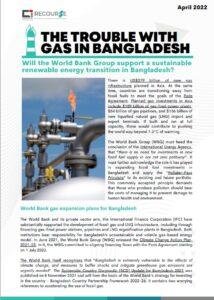 The World Bank and its private sector arm, the International Finance Corporation (IFC) have substantially supported the development of fossil gas and LNG infrastructure, including through financing gas-fired power stations, pipelines and LNG regasification plants in Bangladesh. Both institutions bear responsibility for Bangladesh’s unsustainable and volatile gas-based energy model. In June 2021, the World Bank Group (WBG) released the Climate Change Action Plan, 2021-25. In it, the WBG committed to aligning financing flows with the Paris Agreement starting on 1 July 2023.
The World Bank and its private sector arm, the International Finance Corporation (IFC) have substantially supported the development of fossil gas and LNG infrastructure, including through financing gas-fired power stations, pipelines and LNG regasification plants in Bangladesh. Both institutions bear responsibility for Bangladesh’s unsustainable and volatile gas-based energy model. In June 2021, the World Bank Group (WBG) released the Climate Change Action Plan, 2021-25. In it, the WBG committed to aligning financing flows with the Paris Agreement starting on 1 July 2023.
The World Bank itself recognises that “Bangladesh is extremely vulnerable to the effects of
climate change, and measures to buffer shocks and mitigate greenhouse gas emissions are
urgently needed”. The Systematic Country Diagnostic (SCD) Update for Bangladesh 2021 was published on 8 November 2021 and will form the basis of the World Bank’s strategy for investing in the country – Bangladesh Country Partnership Framework 2022-26. It contains two worrying references to accelerating the use of fossil gas.
First, it claims that “domestic and imported gas is still better than coal”. But this is widely
contested and contradicts scientific evidence. Fossil gas has devastating health and
environmental impacts as well as climate impacts from methane leakages along pipelines and in processing. Methane is a significantly more powerful greenhouse gas (GHG) than CO2. The World Bank must phase out all finance for fossil fuels and support decarbonisation and a transition to sustainable, renewable energy.





![Currents of Change [Brief-03] Quarterly Brief of the Power & Energy Sector of Bangladesh](https://cpd-power-energy-study.com/wp-content/uploads/2024/05/Currents-of-Change-Quarterly-Brief-3-cover-218x150.png)


